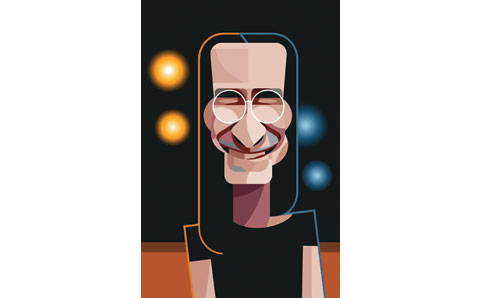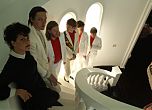
Brazilian avant-garde theatre director Gerald Thomas was back on home territory in July, staging his off-the-wall performance Gargólios at SESC Vila Mariana. With visual references to the 9/11 attacks, a cast dressed mostly as super heroes, a naked woman suspended from the ceiling and dripping blood on the stage, all set to a soundtrack played by Thomas himself on stage on a bass guitar, it was what can only be described as a roller-coaster ride of a performance, that left audiences in São Paulo somewhere between shocked, delighted and utterly confused. Kathleen McCaul caught up with the director backstage after the performance.
I found that play quite difficult to understand.
‘I don’t understand sir, I don’t understand. Because if I did understand, I would say, I understand sir.’ You’ve got a whole chorus there, devised by [Led Zeppelin bassist] John Paul Jones about the fact that you don’t understand.
So it doesn’t matter if people don’t understand?
Of course not. This is not linear theatre with a beginning, middle and end. Whoever gets whatever, gets whatever. I’m not really keen on discussing the virginity of my daughter or the price of milk. If [audiences] can fish out whatever they fish, whether it’s a goldfish, a trout or a fried fish and chips, then it’s all right.
The reaction from the audience here in São Paulo was great – a standing ovation.
I’ve been getting standing ovations in São Paulo for the last thirty years. I was booed in Rio in 2003, and I had to show my bum. I got arrested for that.
Do you find the audiences different in São Paulo and Rio?
Rio is very snobbish, much like New York and London, with cynical audiences. São Paulo really wants to devour culture. Rio still thinks it’s the capital of Brazil – it hasn’t been the capital for fifty, sixty years.
You left São Paulo, and the theatre, a few years ago. Why did you leave?
I’d had enough of theatre. I’d done 85 pieces around the world, in 15 different countries. I’d worked with the best and the worst and I just really wanted to quit.
What sparked your return to theatre?
Addiction. Pure addiction. I had had no intention of continuing, but somehow theatre, and performing arts in general, are addictive and I just couldn’t keep away from it. So I formed the London Dry Opera Company.
How do people react to you in Brazil?
When you become a myth – like I am in Brazil – people don’t leave you alone. They come up to you in restaurants and feel entitled to ask you whatever questions they want – the most inappropriate questions, the most personal questions they could possibly ask you.
What’s the most personal question you’ve been asked?
‘What’s the size of your dick?’ All you want to do is have a private dinner with somebody, but you understand that this is part of the agreement. If you are there, then you might as well be photographed and appear in the social columns the next day. Thank God it’s not the same in New York or London, where Philip Glass can walk the streets and no one gives a flying fuck. We ride the subways and no one cares. I love that, I really love that.
Many of your experiences from 9/11 helped you to write this play. Do you think audiences here get all these references?
This play wasn’t made for Brazil. It’s not a customised play. But this is our reality in New York and London – we live in a world of terror. I was there, at ground zero, for 21 days. I don’t actually remember what I saw live or what I’ve seen 100 billion times repeated on television, from all the different cameras and angles. I don’t remember, but I do know I was on anxiety pills and mood regulators for ten years because of the post- traumatic stress syndrome I suffered.
There’s a lot of violence and rage in the play. Was it a cathartic experience to write it? Did it help you get over what you’ve experienced?
I’m enraged with the youth of today, with their iPods and iPads, completely numbed by everything else. Of course I have an iPod, I have an iPad, I have an i-everything, but I’m not numbed by them. I look. I’m addicted to news. I’ve got CNN on 24 hours a day. I am incensed about the fact that no one really gives a shit about what is going on. In Brazil no one knows what’s going on in the streets of Damascus. I understand that Brazil devours itself, it devours its own telenovelas. Brazilians care about Brazil. Brazilians care about Brazilian pop culture.
So why do you think you’re so popular here?
Because I stand out, that’s all. They also respect the fact that there is
a Brazilian out there representing Brazil in the modern world. I am very proud of that as well.
Anything else you’d like to say to Time Out São Paulo?
I didn’t know there was a Time Out São Paulo. I’ll go to the newsstand and get one.
- Read more interviews




Adorei o desenho / foto , de quem eh ??? Quem fez !!! Parabens pela reportagem ....Muito Boa !!! Gerald Thomas sempre muito bom !!! Sue
Posted on Sun 20 Nov 2011 22:58:29